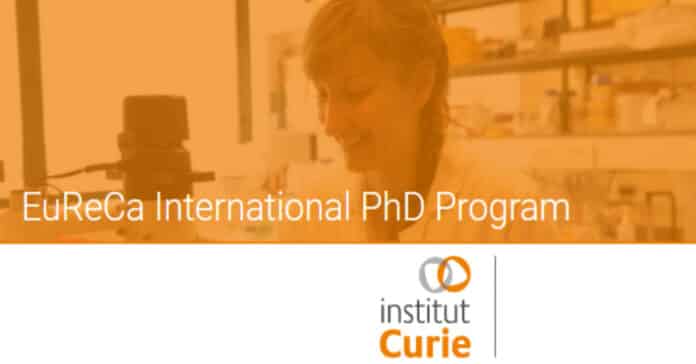EuReCa International PhD Program 2022 Announced – Apply Now !
EuReCa (Europe Research & Care) is Institut Curie’s international Ph.D. Program which provides Ph.D. students with excellent interdisciplinary, inter-sectorial, and international training. It includes a personalized career development plan, coaching, mentoring, and the possibility of undertaking secondments in partners’ institutions.
EuReCa Ph.D. fellows will carry out research in a vibrant environment based on the pluri-disciplinary approaches and excellence offered by over 85 research groups comprising Institut Curie’s 12 research departments grouped into 4 domains and a translational department:
- Biology & Chemistry of Radiations, Cell Signaling & Cancer
- Biology, Cancer, Genetics & Epigenetics
- Integrative Tumour Biology, Immunology & Environment
- Multiscale Physics-Biology-Chemistry
- Translational Research
Call 2022
Reference 2022-01-ALMOUZNI_SIMEONOV
Keyword(s) Development and cancer; Histone variants and marks; Animal models,
Single-cell, Omics.
Director(s) and team
- Thesis director(s) Geneviève Almouzni & Iva Simeonova
- Research team Chromatin Dynamics
- Research department UMR3664 – Nuclear Dynamics
Expected Profile of the candidate
Applicants should have a strong desire to explore cell biological phenomena in an in vivo context and should show solid capacity for independent and creative thinking. Background in molecular and cell biology, developmental biology, mouse genetics, and/or stem cell biology is strongly recommended. Background in immunology is a plus but not compulsory. The project highly relies on transcriptomic approaches. The applicant should have either experience in bioinformatics or a strong motivation to learn.
Description of the PhD thesis project
- To shape the genome in 3 dimensions in the nucleus, DNA is organized into chromatin, of which the basic unit, the nucleosome core particle, comprises about 146 bp of DNA wrapped around histones. Importantly, histones exist as distinct variants with various post-translational modifications (PTM). In each cell type, their distinct genome distribution defines an epigenomic landscape. Strikingly, alterations in histone H3 variants have been reported in brain tumors in children and later in other types of cancers, and the interest in understanding their contribution to genome function is continuously increasing.
- Our team is exploring the role of histone variants in genome organization and maintenance and their link to transcriptional regulation and lineage fate choices. We recently found that a unique amino acid (S31) in the histone variant H3.3 was absolutely essential to complete gastrulation in Xenopus embryos
- Phosphorylation of this evolutionary conserved residue-specific to the H3.3 variant also proved critical in transcriptional control during ES cell differentiation and macrophages activation. Thus, the use of specific histone variants for proper chromatin organization has emerged as essential for cell fate choices.
- The Ph.D. student will investigate histone H3.3 importance in cell fate changes, in the context of normal development and in pediatric glioblastoma. S/he will build on cellular and animal models established in the laboratory to follow cell fate by using cutting-edge transcriptomic approaches, combined with in silicon analysis of public datasets. We hypothesize that unique H3.3S31 phosphorylation could promote transcription at key developmental loci and engage in/maintain specific cell fates.
- The regulation of H3.3 transcription by tissue-specific factors, and the H3.3S31 unique PTM cross-talk with neighboring residues could contribute to cell plasticity during normal physiology and would be high-jacked by tumor programs in cancers harboring H3.3 mutations.
International, interdisciplinary & intersectoral aspects of the project
The Ph.D. student will acquire and develop a broad range of expertise in both bioinformatics and wet lab approaches ranging from basic biology to translational and medical implications. This will entail mastering the use of public datasets, use of cellular and in vivo models, and cutting-edge single-cell transcriptomic (from sample preparation to analysis). The Ph.D. student will benefit from mentoring and/or a secondment abroad via a collaborative network, to obtain additional training on early development embryos, single-cell data, and R&D applications.
EuReCa International PhD Program



